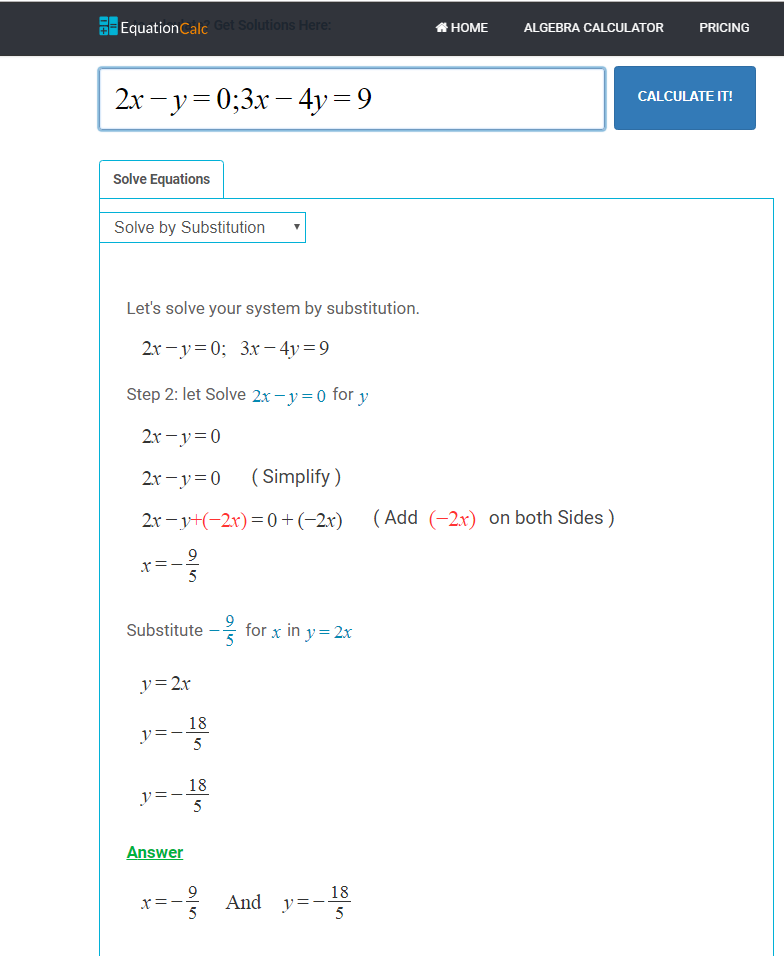
Beyond deciding when to begin receiving retirement benefits, other factors that can affect your benefits include whether you continue to work, what type of job you had, and if you have a pension from certain jobs. There is no incentive to delay claiming after age 70.Įveryone’s retirement is unique.
#Elimination math calculator full#
When you delay benefits beyond your full retirement age, the amount of your retirement benefit will continue to increase up until age 70. Visit our website to learn how claiming retirement benefits early will affect your benefit amount. However, we’ll reduce your benefit if you start receiving benefits before your full retirement age. You can get Social Security retirement benefits as early as age 62. You can find your full retirement age by birth year in the full retirement age chart. For anyone born 1960 or later, full retirement benefits are payable at age 67. The full retirement age increases gradually if you were born from 1955 to 1960, until it reaches 67.

The full retirement age is 66 if you were born from 1943 to 1954. Full Retirement Ageįull retirement age is the age when you can start receiving your full retirement benefit amount. There are three important things to know about age when thinking about when to start your benefits. The age you begin receiving your retirement benefit affects how much your monthly benefits will be. What Age Should You Start To Receive Benefits? To make an informed choice, consider the following factors as you think about when to start your Social Security benefits. We will reduce your benefit amount if you decide to start benefits before reaching full retirement age. If you choose to retire and begin receiving benefits when you reach your full retirement age, you’ll receive your full benefit amount. If you don’t have a personal my Social Security account, create one at Choosing when to start receiving retirement benefits is a personal decision. If you have a personal my Social Security account, you can get an estimate of your personalized retirement benefits and see the effects of different retirement age scenarios. Knowing what you will get every month in retirement benefits helps you plan for your retirement. Create your account now to check your earnings history online. You can find your earnings history with a personal my Social Security account. Regularly checking your Social Security earnings history can help ensure there are no surprises when it’s time for you to start receiving benefits.

The amount of the Social Security benefits you or your family receives depends on the amount of earnings shown on your record. Visit our retirement benefits webpage for more information on how Social Security Credits work. We can’t pay any retirement benefits until you have 40 credits. If you return to work later, more credits may be added. If you stop working before you have enough credits to qualify for benefits, the credits will remain on your Social Security record. If you were born in 1929 or later, you need 40 credits (usually, this is 10 years of work). The number of credits you need to get retirement benefits depends on when you were born. When you work and pay Social Security taxes, you earn “credits” toward Social Security benefits. As you make your retirement plan, knowing the approximate amount you will receive in Social Security benefits can help you determine how much other retirement income you’ll need to reach your goals.

On average, retirement beneficiaries receive a portion of their pre-retirement income from Social Security. Social Security Should Be Just One Part of Your Retirement Plan While many factors affect retirement planning, we want you to understand what Social Security can mean to you and your family’s financial future.

You’ll need to plan and save for years to achieve your retirement goals. Planning is the key to creating your best retirement.


 0 kommentar(er)
0 kommentar(er)
